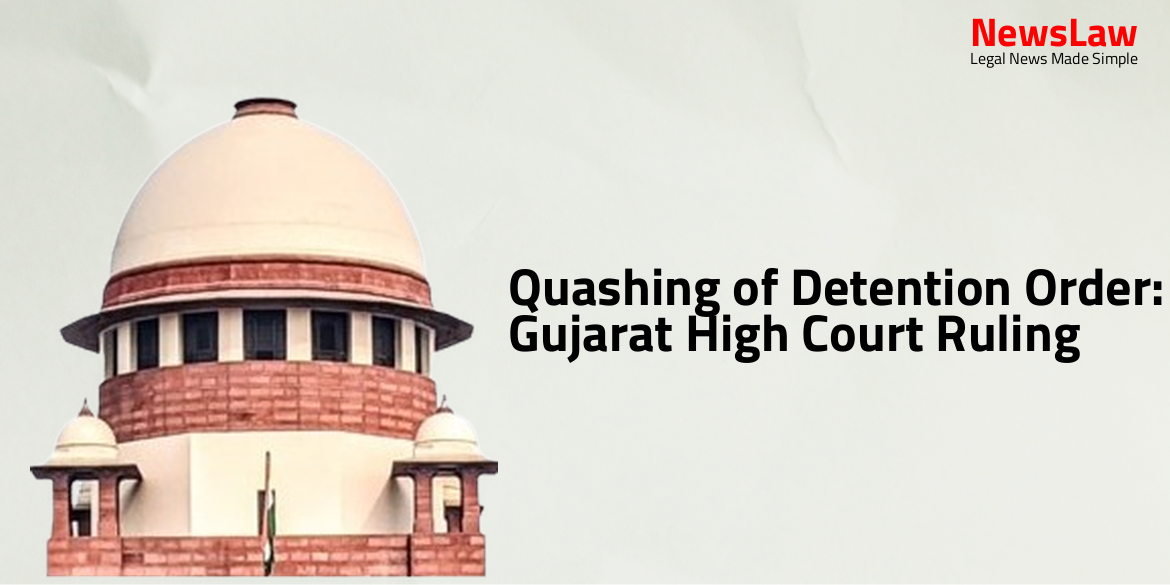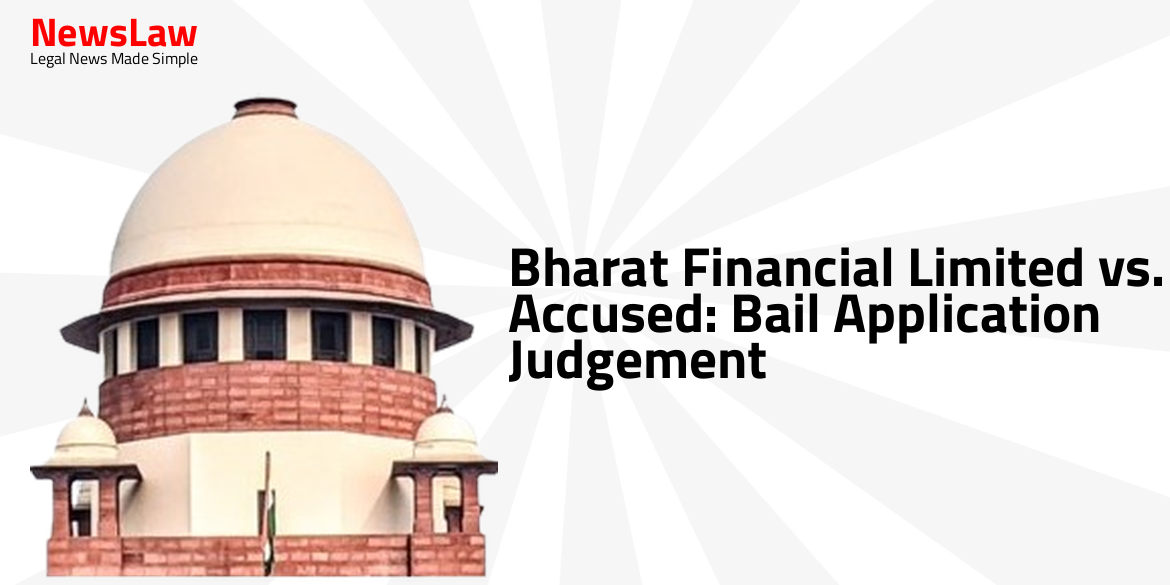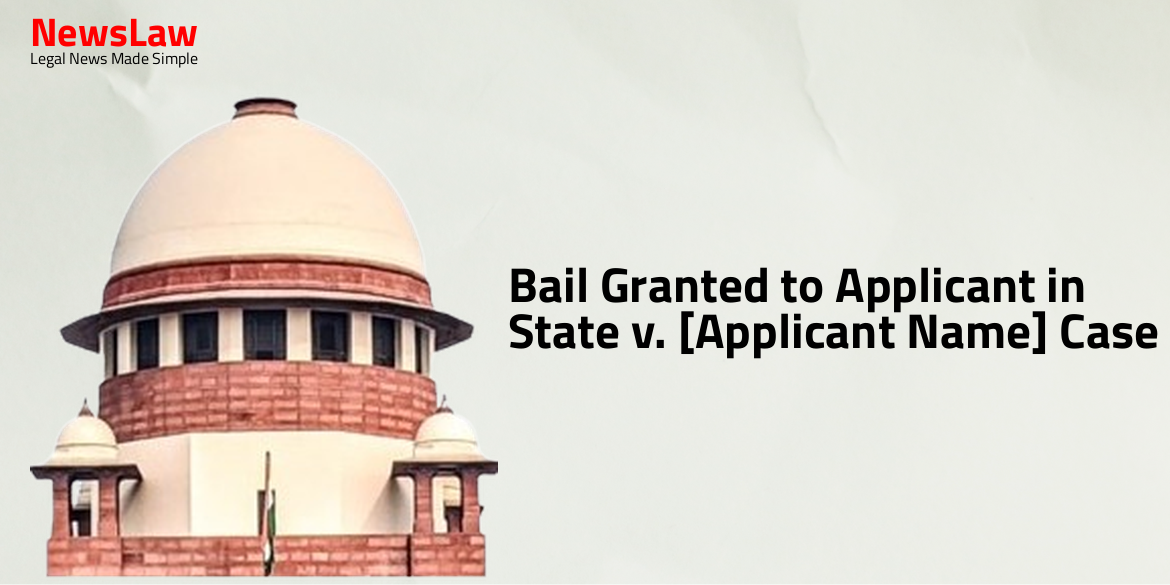In a significant development, the Gujarat High Court has quashed the detention order dated 24.01.2024 under the Gujarat Prevention of Anti-Social Activities Act. The case revolves around the detention of the petitioner, highlighting the importance of distinguishing between disturbances to law and order versus disruptions to public order. The Court’s ruling sheds light on the need for a strong legal basis before resorting to preventive detention measures, ensuring the protection of individual liberties while upholding public order standards.
Facts
- The present petition is directed against the order of detention dated 24.01.2024 passed by the detaining authority under the Gujarat Prevention of Anti-Social Activities Act, 1985.
- The petitioner is defined as the detenue under Section 2(b) of the Act.
- The detention order was exercised under Section 3(1) of the Act.
Arguments
- Except for the statements of the witnesses and the registration of FIRs, no other relevant material is present to categorize the detenue’s activities as a breach of public order.
- The impugned detention order is challenged on the grounds of being solely based on the registration of FIRs related to the Prohibition Act offenses.
- The detention order does not fall under the purview of the Act’s definition based solely on the mentioned FIRs.
- The alleged illegal activities of the detenue do not have a nexus with public order but can be considered a breach of law and order.
- The learned advocate for the respondent argues in favor of the detention order, stating that sufficient evidence was found during the investigation.
- The advocate emphasizes that the detaining authority passed the order based on the petitioner’s habit of engaging in activities defined under the Act.
- The advocate asserts that the detention order is valid and should be upheld by the Court.
Analysis
- The case at hand showcases a lack of proper consideration of relevant circumstances by the detaining authority.
- For a person to be detained under Section 2(b) of the Act, there must be a demonstrated threat to public order that jeopardizes the social apparatus.
- The absence of concrete evidence indicating the detainee’s dangerous behavior towards public order weakens the case made by the detaining authority.
- Reference to a recent Supreme Court case emphasizes that preventive detention should not be used as a substitute for normal legal procedures unless there is a clear threat to public order.
- The hierarchy of legal concerns ranging from law and order to security of the State is outlined, highlighting the need for proportionate response based on the severity of the threat.
- The State has alternative courses of action such as seeking cancellation of bail or appealing to a higher court if a detainee poses a significant danger to society, rather than resorting to preventive detention unnecessarily.
- The Court criticizes the routine and unjustified use of preventive detention laws in the State of Telangana.
- The distinction between disturbance to ‘law and order’ and disturbance to ‘public order’ has been clarified in the case of Dr. Ram Manohar Lohia vs. State of Bihar, reported in AIR 1966 SC 740
- Merely disturbing law and order is not enough for action under the Defence of India Act; disturbances subverting public order are necessary.
- Several detention orders under the Telangana Act of 1986 have been quashed in the last five years for incorrectly applying public order standards.
- Court observed that acts of individual assault do not necessarily lead to public disorder.
- Disorder is prevented by maintaining law and order, but public disorder involves more serious disturbances.
- Several detention orders under the Telangana Act of 1986 have been set aside by the High Court of Telangana within the last year.
- Detaining authorities misuse the power of preventive detention, leading to unfair detentions.
- Detaining authority’s apprehension of adverse impact on public order is a mere speculation, especially when there have been no reports of unrest.
- Detention based on grave allegations should meet lawful standards to impact public order.
- Contravention of law affects order, while affecting public order requires impacting the community or public at large.
- Personal liberty cannot be sacrificed under preventive detention without genuine risk to public order.
- Acts may impact law and order but not necessarily public order or security of the State.
- Powers of preventive detention are exceptional and require clear distinction between law and order and public order.
- Maintaining public order must involve disturbances affecting the community or the public at large.
- Distinguishing between serious/aggravated disorder and minor breaches of peace
- Serious/aggravated disorder directly affects the community/public interest
- Minor breaches of peace primarily injure specific individuals
- Action under Preventive Detention Act for disorders affecting public order
- Simplicitor registration of FIRs without nexus to public order not sufficient
- Authority cannot act under Preventive Detention Act for mere disturbance of law and order
Decision
- The impugned order of detention dated 24.01.2024 passed by the detaining authority is quashed and set aside
- No other relevant and cogent material exists for invoking the power under Section 3(1) of the Act
- The present petition is allowed
- The petitioner, as the detenue, is ordered to be set at liberty forthwith if not required in any other case
- Rule made absolute to the above extent
- Direct service is permitted
Case Title: MANMATH @ MUNNO MALIYO BRAJBANDHU PANIGRAHI THROUGH HIS FRIEND RATHOD MAYABEN HITESHBHAI Vs. COMMISSIONER OF POLICE OF CITY OF SURAT
Case Number: R/SCA/1952/2024



